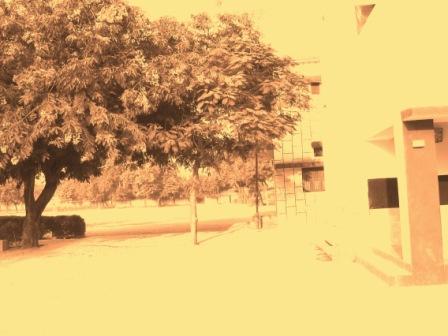Still...
[By Firaq Gorakhpuri. Translated from the Urdu by Siyaah]
Who has ever belonged to another for life? Still...
This beauty and love is all deception; but still...
A thousand times has the world traversed through here-
Something about your passage is new still.
A lifetime has gone by in avoiding your gaze-
The dagger has pierced through to life's artery still. [3]
[3] rag could literally mean vein or artery.
neshtar literally means lancet, but the meaning contained in 'dagger' is closer to the context.
Subscribe to:
Post Comments (Atom)






7 comments:
very nice poem and great translation!
nice translation as always..
i guess poets prefer to use 'veins', it's only the people of sciences who use 'artery'.
whatever is the opposite of "lost in translation"!
Wonderful translation! Though the dagger part sounds a bit wierd. Thats a language related problem though. You can only 'feel' the poetry in the Urdu version.
Anonymous: thanks. you keep me going with your positive comments :-)
Introvert: Hey, thanks for pointing that out. I agree. It was a tough choice. 'rag' refers to 'blood vessels', so both 'vein' and 'artery' could be used. I just kept 'artery' because it added the contextual meaning of "source of life" in singular, which seemed a bit tough to achieve with the singular 'vein'. I might rethink though...
phoenix: i guess that would simply be 'found in translation', right? (esp. relevant for those who might not have ever seen the original urdu works).
tapasya: yes. the last couplet was the tough one, for sure...what with the 'neshtar', 'rag-e-jaan' symbolism. I might be able to improve it somehow in another version.
I really enjoyed the critical feedback this time! I need more of that, which will help shape up these works better. Translation is indeed an interesting exercise...doesn't work equally well in all cases...and is an ongoing process i.e. I need the feedback! Thanks!
great translation drawing on the "vein" of poignancy to be found in all of us...
but maybe,in my personal opinion,the use of the word "traversed" in the second stanza could be modified..traversed would imply a completion of the journey,but the original,"hazaar baar zamana dhar se guzra hai" would imply,to me,that the journey is yet in progress..why else a thousand passages?an alternative could be "crossed",but again,that also implies completion,besides being much too crude...to me;perhaps a plain and simple "passed" would be the best..but that would depend on the interpretation of the text as made by you..or me..
sandeip(word_smith)
word_smith:
Thanks for stopping by...and sharing your thoughts candidly. Yes, it is all interpretation eventually. "idhar se guzra hai" = "has traversed through here" seemed the best choice, in terms of both content (meaning) and style, as I saw it...
Post a Comment